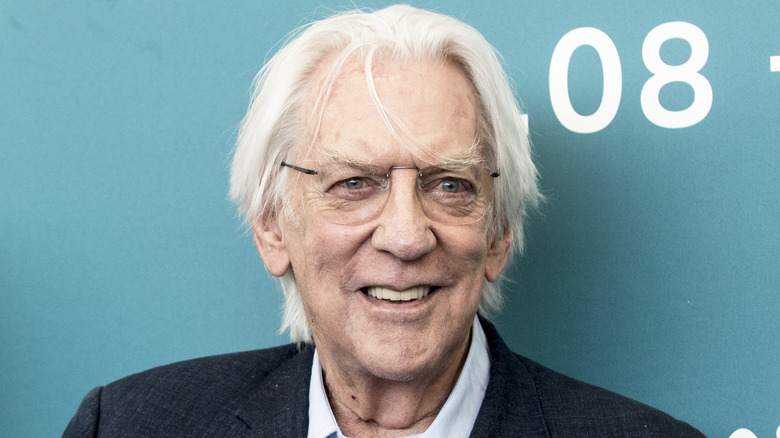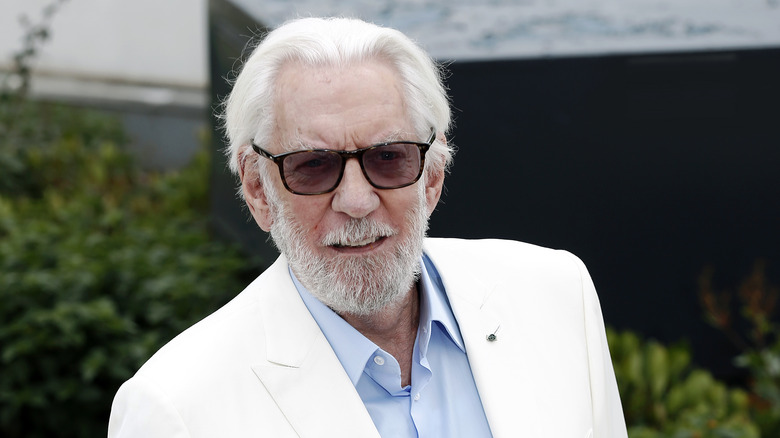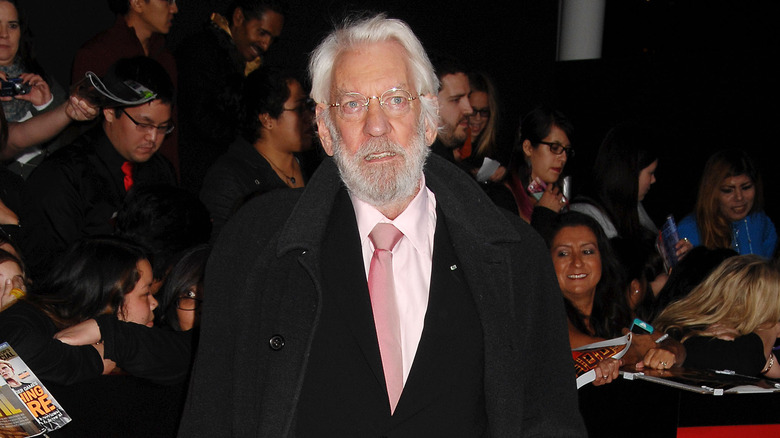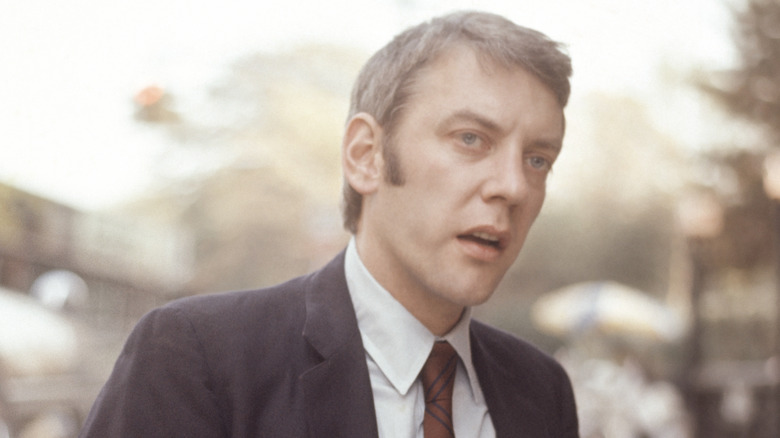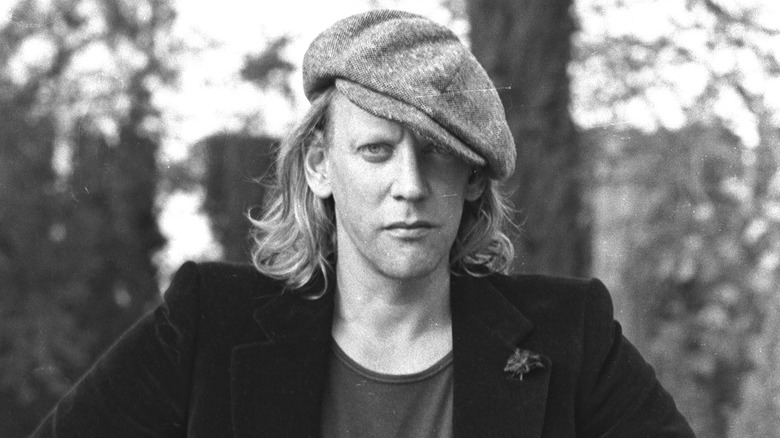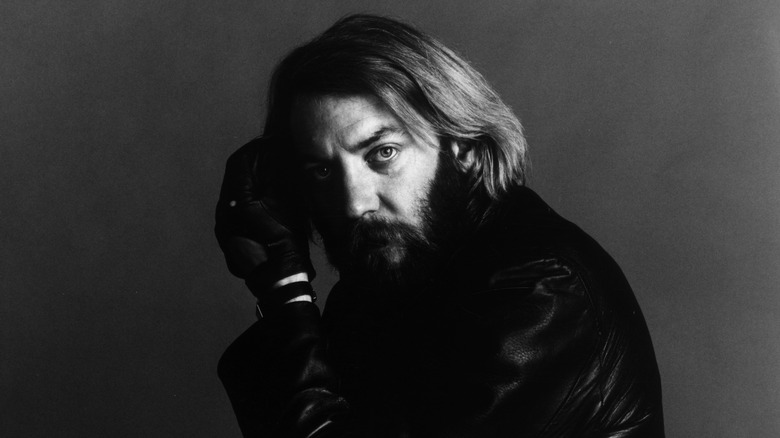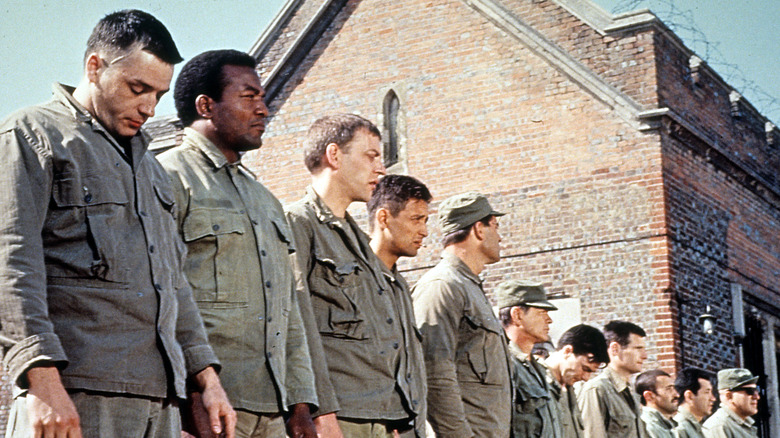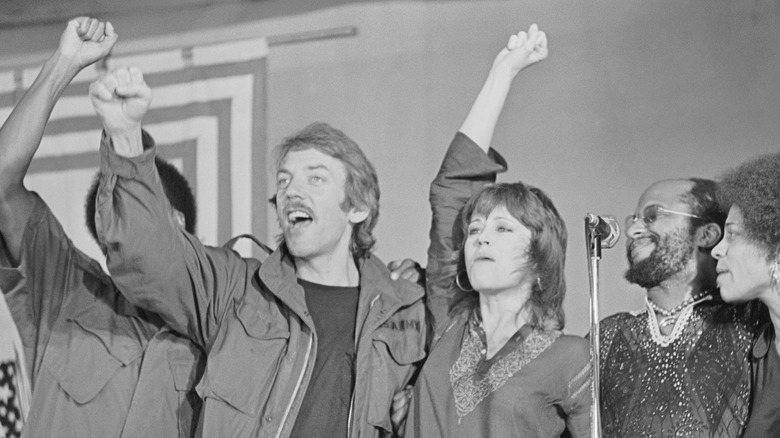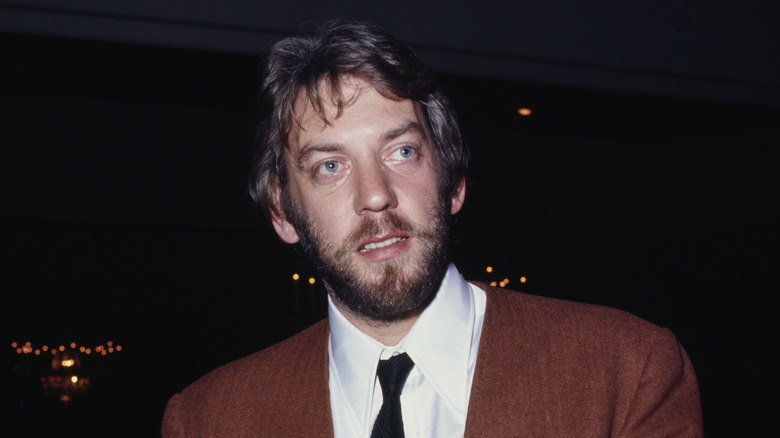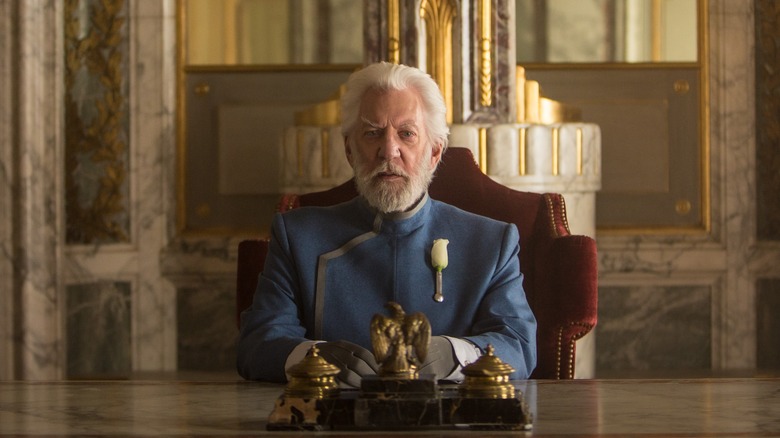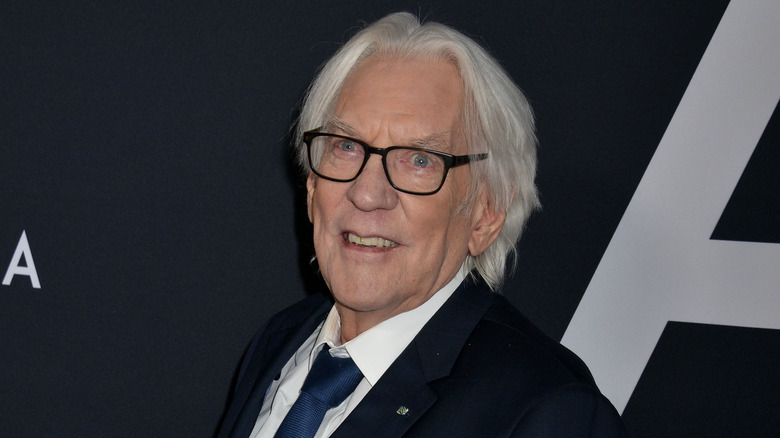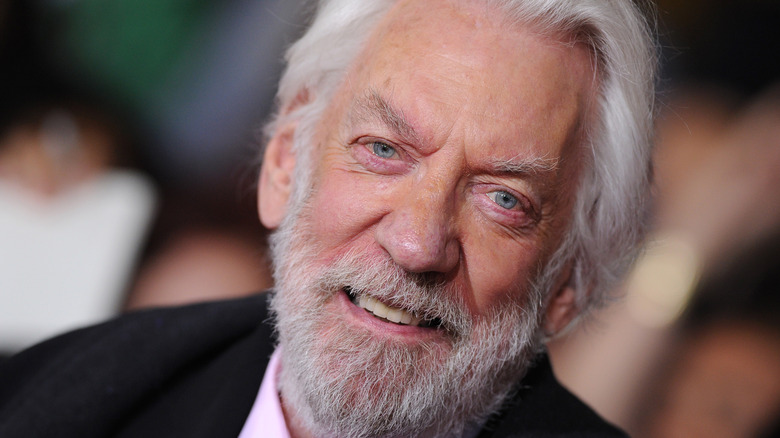The Truth About Donald Sutherland Is Tumbling Out
On June 20, 2024, the world learned that Donald Sutherland died of an undisclosed long-term illness at his home in Miami. The renowned actor was 88 years old at the time of his death, and he spent more than six decades of his life in show business, but there's much the world might not have known about the storied actor.
Sutherland began his career in the U.K. theater scene, followed by roles on British television. He didn't make his feature film debut until he was over 30 years old, in the 1964 Italian horror movie, "The Castle of the Living Dead." He broke out three years later with "The Dirty Dozen," and solidified himself as a star with "M*A*S*H," "Kelly's Heroes," and "Klute." By the time he passed away, Sutherland had appeared in nearly 200 films and television shows, in addition to his work in theater and narration.
Sutherland left behind a Hollywood dynasty, with all five of his kids — Kiefer, Rachel, Roeg, Rossif, and Angus — involved in show business, including Emmy-winning Kiefer, who was named after the director of Sutherland's first film, Warren Kiefer. His four sons were all named after famous directors, but that is just the tip of the iceberg in terms of interesting things about the late actor's life and career.
Donald Sutherland was death-obsessed as an ill child
Donald Sutherland was born in 1935 to a salesman father and math teacher mother. Along with his parents and two siblings, he lived in the Canadian coastal town of Saint John, New Brunswick for the first 12 years of his life before moving to Bridgewater, Nova Scotia.
His earliest years were fraught with illness, beginning with the polio he suffered from as a toddler. "The first word I said was 'neck,'" the actor once told Esquire. "My mother turned around and said, 'What did he say?' My sister said, 'He said, 'Neck.” My neck was killing me. That was a sign of polio. One leg's a little shorter, but I survived."
In addition to polio, Sutherland also contracted hepatitis and rheumatic fever as a youngster, the latter of which forced him to miss all of the fourth grade. Because he had so many bouts of illness, the actor spent a lot of his time indoors doing things like reading, and eventually developing an odd fascination with mortality. "I was somewhere between 6 and 10. I was obsessed with not knowing what happened after you were dead," Sutherland explained to GQ. "And I sat or kneeled for a whole day with my head against the wall, trying to figure it out. But I couldn't, and I just said, 'Okay.' And then it was nothingness."
He wasn't a fan of his self-centered father
Donald Sutherland had only positive things to say about his mother, Dorothy Isobel, but he was not a big fan of his father, Frederick McLae Sutherland. After his mother's funeral — where Frederick scarred one of his grandchildren with terrible jokes — Donald did not see his father for two to three months. Just when he decided he was ready to head back to Canada for a reunion, Donald received a call informing him that his father had died.
"I called the woman who had been taking care of him and said, 'Did he say anything?'" Sutherland recalled in his interview with GQ. "She said, 'Yes. He said, 'It was better when the children were young.' And I said, 'Thanks a lot for that — that was really helpful.' Anyway. Hard — he was hard to deal with."
In the same interview, the actor referred to his father as "possibly the most self-centered individual I've ever met." His father was supposedly adoring until Sutherland achieved success with "M*A*S*H," after which all he could do was complain. Sutherland also took issue with how his father treated others in the family, telling The Times, "He was just not as nice as he should have been with my mother. She was docile and he was a bully."
He worked in radio as a teenager
Growing up in a small town in Canada, there weren't a ton of opportunities for young people like Donald Sutherland to hone their performance skills. At some point, he got it into his head that he wanted to be in radio — and he didn't take no for an answer.
At only 14, Sutherland spent weeks hanging outside of the local CKBW station, hounding radio personnel to let him take the mic. One program director eventually bit, and Sutherland was hired as a news reader and disc jockey at the station. This radio gig was the beginning of Sutherland's long and lucrative voiceover career. He voiced characters in many projects, including "Pirate's Passage," "Astro Boy," and "Final Fantasy: The Spirits Within."
Sutherland became known for his deep tone, which also made him a popular choice for documentary narrator roles. He gave voice to a multitude of projects including "JFK Revisited: Through the Looking Glass," "The Last Continent," and "Queen Victoria' Empire," a four-part TV series. The actor also had long-standing relationships with many brands — most notably Simply Beverages, Delta Air Lines, and Volvo – and his voice was featured in dozens of commercials for decades.
He didn't return to England for 15 years over a tax issue
Donald Sutherland graduated from Victoria University in Toronto, which is where he met his first wife, Lois Hardwick. Together, they moved to England in 1957, after which Sutherland did a brief stint at drama school. He only lasted a year at the London Academy of Music and Dramatic Art but remained in the United Kingdom for quite a while. He followed LAMDA up with 18 months at Perth Repertory Theatre in Scotland, then headed back to England to break into British film and television. Sutherland's two oldest children, twins Kiefer and Rachel, were born in England in 1966 — the same year the actor married their mother, Shirley Douglas.
Though he clearly liked living in London in the 1950s and 1960s, Sutherland didn't return to England for 15 years after one of his stints there. He was incredibly angry about tax issues that left him near broke. Sutherland told Esquire that he thinks one reason for the audit was Douglas's arrest for buying hand grenades during their marriage, but whatever the reason, he blamed the U.K. government for his money situation for a long time.
"No, I'm not rich. I had a tax problem in this country, curiously enough, and my accountant said the British government was patently wrong in taxing me, and they were, but we couldn't persuade them and it cost me everything I had," he told The Times in 2005.
He had trouble getting cast due to his unconventional looks
Donald Sutherland was the first to note that he wasn't your typical Hollywood stud. In fact, the actor often referred to himself as "unattractive" and frequently recounted past experiences where he was told as much by others.
Sutherland was bullied at school for his appearance — the kids called him "Dumbo" because of his ears — and, as a teen, asked his mother for her honest opinion. "I said: 'Mother, am I good looking?' And my mother looked at me and went. 'Your face has character, Donald'," he recounted on "60 Minutes" in 2018.
Though Sutherland's looks were eventually embraced by Hollywood, for a long time, they stood in the way of him getting cast in major roles. For example, at the start of his career, his looks were named as the reason he wasn't cast for his first-ever movie offer and audition. "They were all on the phone saying how wonderful the audition had been," he recounted to GQ. "And then the producer said, 'We loved you so much, we wanted to explain why we weren't casting you. We've always thought of this as a guy-next-door sort of character, and we don't think you look like you've ever lived next door to anybody.'"
His big break was a bit of a fluke
It took Donald Sutherland a long time to find success in Hollywood, and he didn't become an established leading man until appearing in "Klute" in 1971. That movie was preceded by very successful turns in the ensemble films "M*A*S*H" and "Kelly's Heroes" the previous year, but Sutherland had done more than a dozen films before 1970. The 1967 film "The Dirty Dozen" is widely credited with giving Sutherland his big break. Though he had a smaller part, the actor was originally not even one of the "dirty dozen" convicts in the penal military unit at the center of the film. It was a combination of luck and fate that gave Sutherland the break he truly needed.
Sutherland was originally cast in a role that had barely any speaking lines, but he got a huge gift when one of the lead actors refused to do a particular scene. "Bob Aldrich [the director] looked down the table and said, 'You with the big ears, you do it.' He didn't know my name. And it changed my life," he told The Times. His casting led to him appearing in another war movie, "M*A*S*H," three years later, which set the stage for Sutherland's subsequent five decades of success. Without "The Dirty Dozen," the actor may have remained a virtual unknown.
His anti-war advocacy landed him on a government watchlist
The psychological thriller "Klute" was a huge film for Donald Sutherland; both because it was well-received and also because it brought him into contact with fellow acting heavy-hitter Jane Fonda. Fonda — who won an Academy Award for her work in the film — had a large impact on Sutherland's life, personally and publicly.
The two actors became fast friends and — before filming even started — lovers. "We'd already been cast but had not started shooting. And one day, she made it very clear, via a somewhat provocative suggestion, that I should come home with her. And I just said, 'Okay,'" Sutherland recalled to Rolling Stone. Sutherland's relationship with Fonda largely inspired him to become involved with the anti-war movement.
Alongside Fonda and other politically-minded Hollywood stars, Sutherland was part of a traveling revue called "Free the Army." Documents declassified in 2017 showed Sutherland was on the National Security Agency's watchlist from 1971 to 1973, at the request of the Central Intelligence Agency. "We believed. We really believed that change was going to happen. We really believed it. But it was hard. Kennedy was killed, and when Bobby [Kennedy] was killed and Martin Luther King was killed," Sutherland explained to The Times. In addition to his Vietnam activism, Sutherland was also believed to have been a supporter of the Black Panthers. His second wife, Shirley Douglas, was even arrested at one point for allegedly raising money for the group's hand grenades.
He was a Montreal Expos superfan
Donald Sutherland was an extremely proud Canadian, so it makes sense that his favorite sports team was one with Canuck roots. He has been described as a "superfan" of the Montreal Expos, the first non-American baseball team to participate in Major League Baseball. Sutherland supported the Toronto Blue Jays after the Expos moved to Washington and changed their name in 2005, but his support for the Jays was mild compared to his love for the Expos.
"We knew he was a superfan, he was always seated on the third-base side of Olympic Stadium, just about 10 rows from the field," former Expos PR chief Richard Griffin told The Seattle Times. "He made his movie schedule and he made his summer schedule around the Expos' schedule."
Sutherland — a longtime owner of a home not far from Montreal — chose the Expos as his team right after they made their MLB debut in 1969. When he agreed to narrate a 20th anniversary Expos film project in 1989, all he asked for was season tickets. In general, Sutherland was very quiet with his fandom, refusing interviews from sports reporters and avoiding photos whenever possible. "This is one of the biggest of all Expos fans: Donald Sutherland," Bob Costas announced during a 1983 broadcast (via The Seattle Times). "This is not the kind of celebrity who shows up at a World Series game and makes sure he gets a seat by the TV camera. This is a legitimate fan."
He wrote a letter to get his role in the Hunger Games
Donald Sutherland has been in a ridiculous amount of films, but for a whole generation of people, he will be best remembered as President Snow from the "Hunger Games" series. The actor appeared as Coriolanus Snow in the first four films in the franchise, all released between 2012 and 2015. It was a role he was so passionate about that he actually wrote a letter to the powers-that-be, despite Snow's limited presence in the first film.
"Nobody asked me to do it. I wasn't offered it. I like to read scripts, and it captured my passion. I wrote them a letter," he said in a GQ article. "The role of the president had maybe a line in the script. Maybe two. Didn't make any difference. I thought it was an incredibly important film, and I wanted to be a part of it." His agent showed the letter to director Gary Ross, who not only jumped at the chance to have Sutherland in the film, but even wrote some additional scenes for the actor.
Sutherland explained he was drawn to "The Hunger Games" due to its themes of power, inequality, and hope, as well as his own belief that the film could motivate young people to become more politically engaged. "If you take from it what I hope you will take from it, it will make you think a little more pungently about the political environment you live in and not be complacent," he told The Guardian in 2013.
He never wanted to become an American citizen
Donald Sutherland was very proud to be a Canadian citizen, but that surely did not stop him from taking up residence in other places. He did multiple stints in England, including his first in the late 1950s and 1960s, and also lived in France and the United States in later years. He died at his home in Miami and, at one point, lived in Santa Monica. In the summers, Sutherland spent his time at his Quebec home, 90 minutes from Montreal in the lakeside village of Georgeville. In his interview with GQ, Sutherland identified that remote estate as an "ancestral home for his kids and grandkids." He bought the place in 1977 and it has particular emotional importance to the family.
In the winter, Sutherland's time was split between Miami and his home in Paris, which is where his three younger children attended school. Despite having homes in multiple countries, Sutherland saw himself as a "Canadian through and through" and never wanted to become an American citizen. In an interview for the CBC radio show "Q with Tom Power" (via The Independent), he noted the differences in Canadian versus American humor as one of the defining reasons.
He considered his commemorative stamp his biggest achievement
While Donald Sutherland was incredibly proud to be Canadian, Canada was similarly proud to count the actor as one of their own. Sutherland was dubbed an Officer of the Order of Canada in 1978 and was inducted into Canada's Walk of Fame in 2000. One of his grandest moments was participating as a flag bearer during the opening ceremony of the 2010 Olympics, held in Vancouver, British Columbia.
But for Sutherland, none of it could compare to the honor bestowed upon him by the Canada Post Office. "Anyway, I love the country. I'm very, very proud that they gave me a stamp," he said on "Q with Tom Power" (via The Hollywood Reporter). "Do you know that that goes everywhere in this country and abroad? That puts me on letters that go everywhere. I love it. I am so touched by it."
In the Power interview, Sutherland referenced the stamp as his biggest career achievement, even bigger than the honorary Oscar he was awarded in 2017 (he was never nominated). "I really wished that [my mother] could have seen me. You know, when you're 88 years old — very nearly 89 — it means a lot, a stamp, because we grew up writing letters ... The stamp for me is everything, just everything!" he exclaimed (via CBC). Sutherland was so excited about his stamp that he even invited fans to send him postcards using it for postage. He provided his Georgeville, Quebec, address for listeners after the interview with Power.

